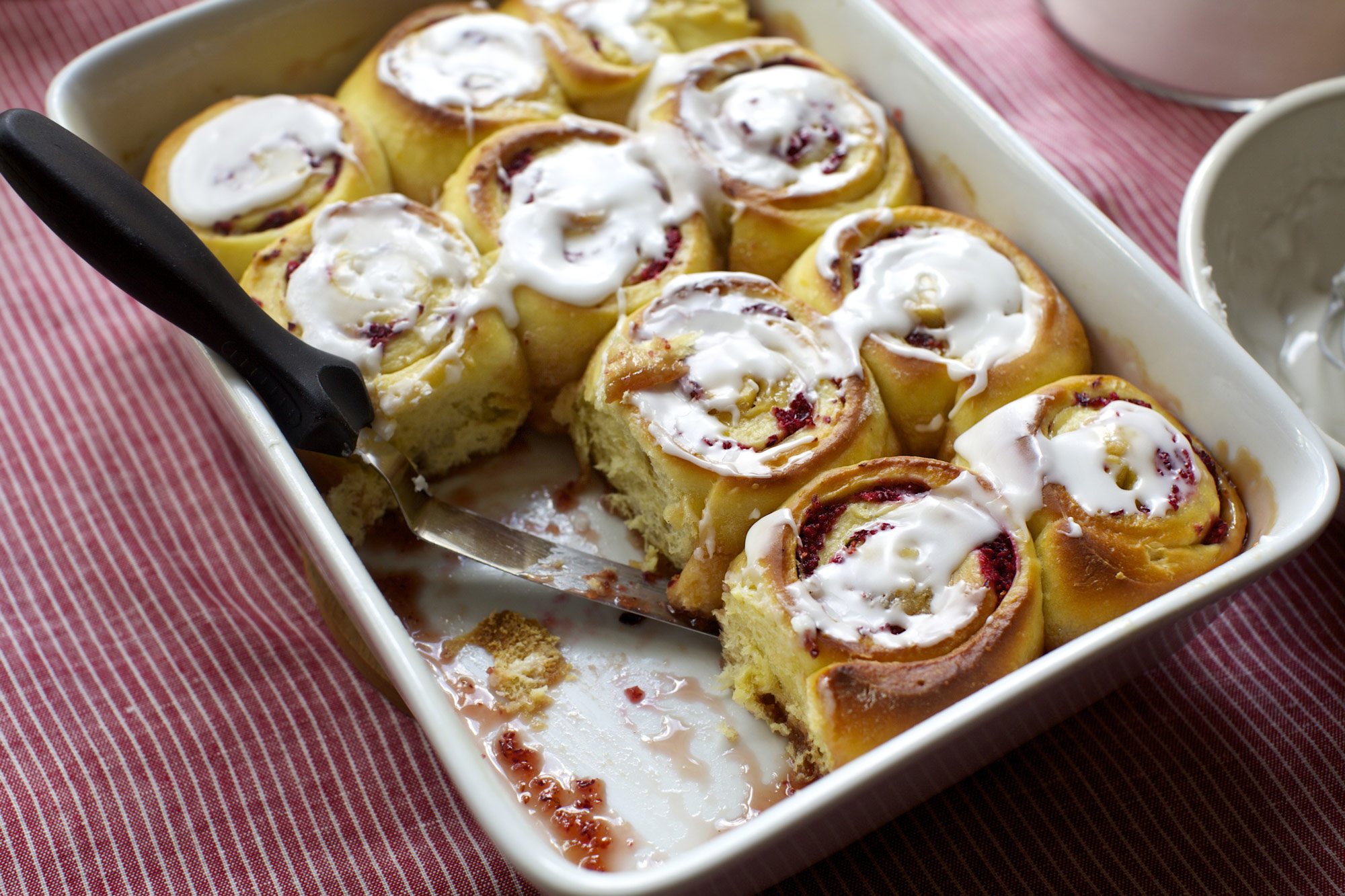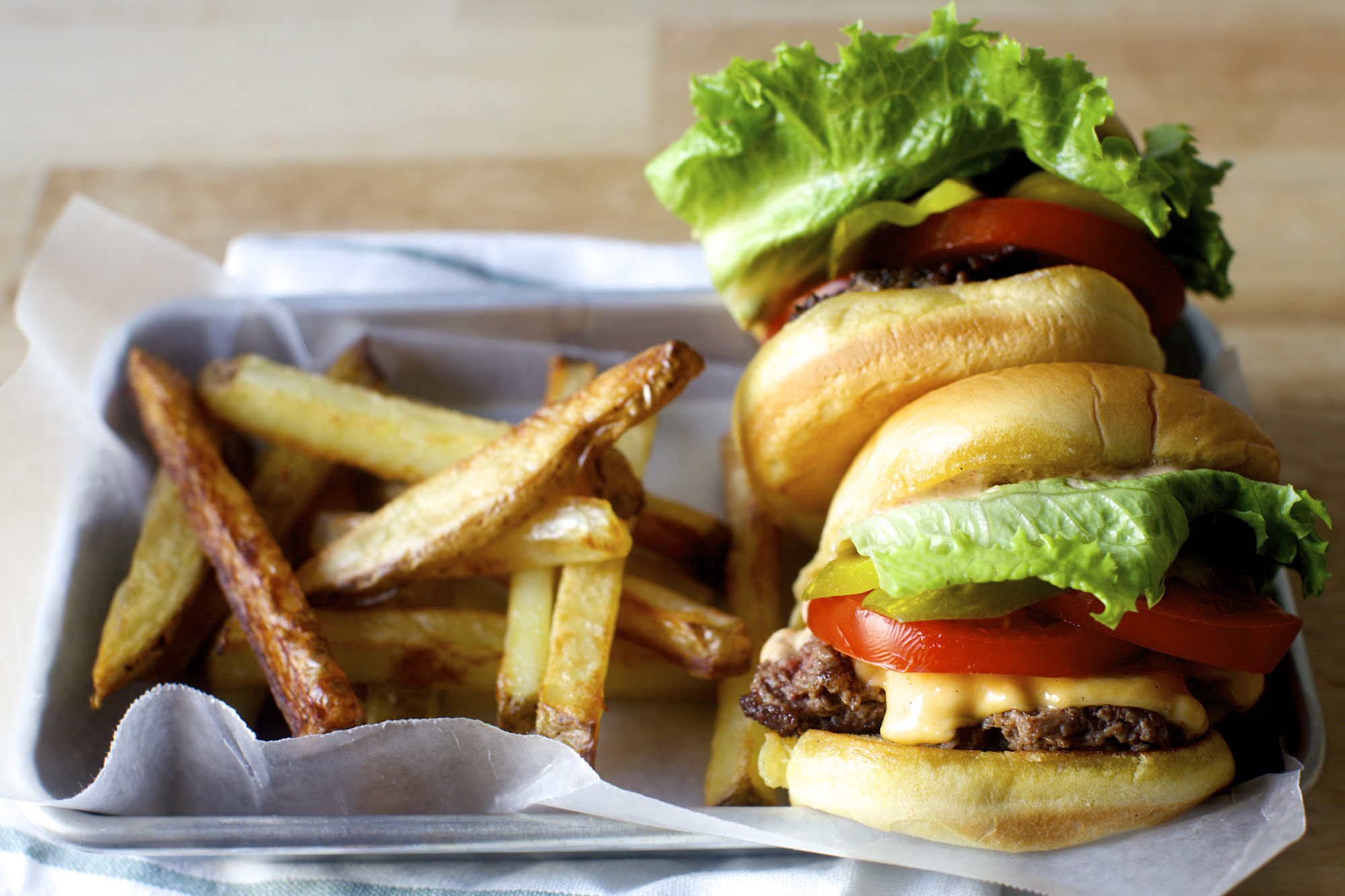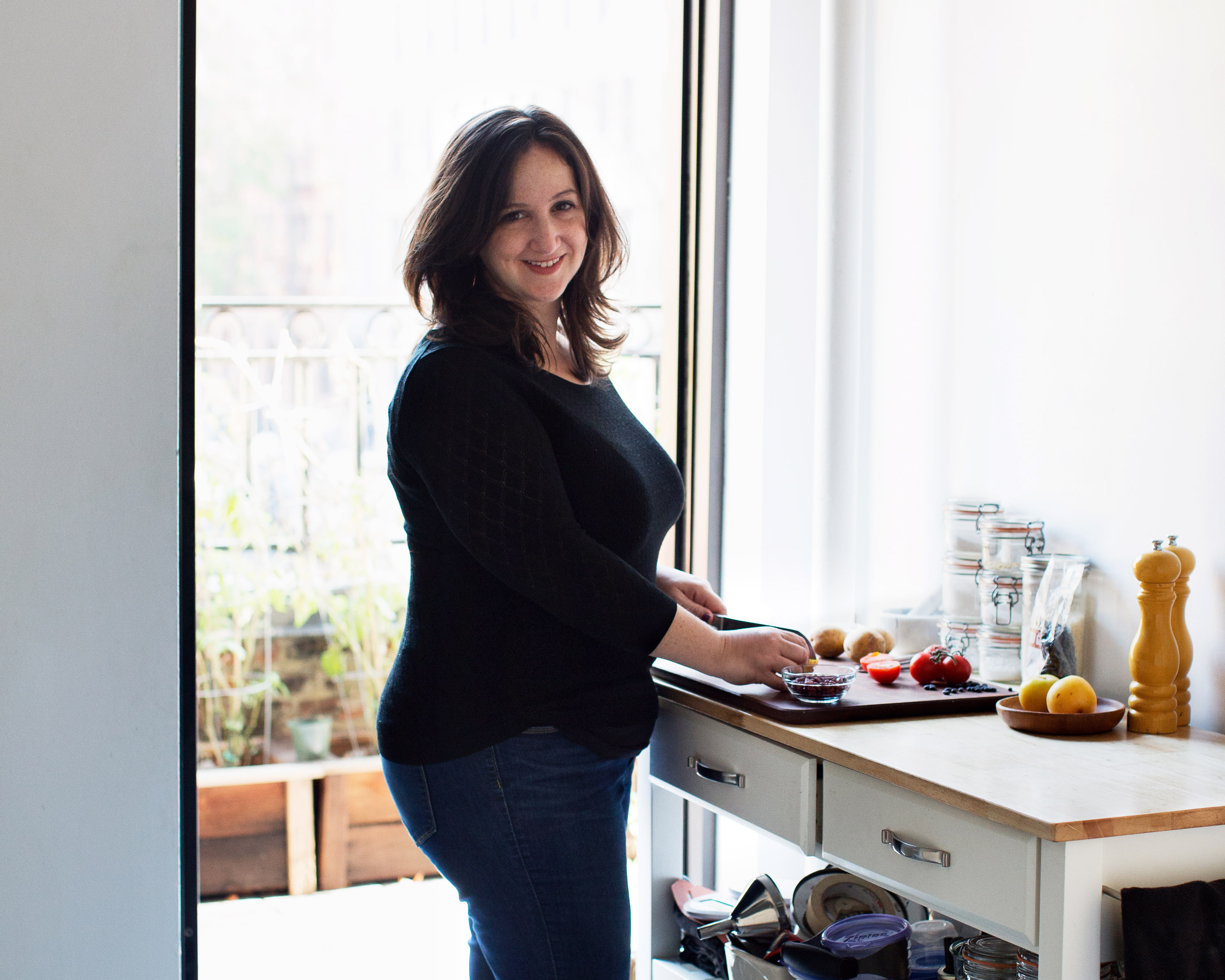
- Interview by Tammi Heneveld November 24, 2015
- Photography by Caroline Petters
Deb Perelman
- writer
- cook
Deb Perelman is a New York City-based writer and cook behind the beloved and unpretentious food blog, Smitten Kitchen, which she started in 2006. She and her recipes have received accolades from the likes of New York Times, Martha Stewart Living, NPR, and TIME Magazine. Her first cookbook, The Smitten Kitchen Cookbook, was released in 2012 and debuted at No. 2 on the New York Times best-seller list. She is currently writing her second cookbook, which is expected for release in Fall 2017.
Describe your path to what you’re doing now. I was raised in New Jersey, and I loved keeping a journal when I was growing up. I’ve always found the process of taking ideas from my head and putting them onto paper relaxing. It was probably a natural progression to go from journaling to blogging.
I also enjoyed drawing and painting while growing up and assumed I’d do something with art as an adult. But when I got to college, I was scared off by the possibility of earning an art degree and not being able to do anything with it. I suspect that, at the time, I felt a lack of confidence about being a good enough artist to make a living, combined with a fear of not knowing what to pursue. Lots of people do lots of things with art degrees, but I wasn’t sure if I was one of them. I decided to pick something with a more practical application, but I ended up majoring in psychology, even though I knew I didn’t want to be a psychologist. I was still interested in painting and ceramics, so I minored in fine art.
Did you major in psychology because you thought it was something your parents would approve of? I don’t know if my parents explicitly discouraged me from majoring in art, but, at times, I almost wish they had. I didn’t really know what I wanted to do. This might sound terrible, but a big part of life is just paying your bills, so I focused on what would open up job opportunities for me.
Art was more of a hobby for me, anyway—I also liked swimming, but that didn’t mean I wanted to become a professional swimmer. Even if I had pursued an art degree, how does having a degree even validate your ability as an artist? In the end, you don’t need an art degree to make art. If you’re interested in something, you’re going to do it anyway.
I graduated from George Washington University with a major in psychology and a minor in fine art, but I had no idea what to do with either of them until I heard about a program at my alma mater that combined the two. I spent a year earning my master’s degree in art therapy and worked as an art therapist for about four or five years.
It occurred to me pretty early on that art therapy was not my calling. I was at a pay grade ever so slightly above the poverty line, which allowed me to move to New York and live in a crappy apartment with some roommates. I was barely able to pay my bills, and I remember that time being a major period of flux for me. I didn’t like my job, but you can’t not work in New York. I still had no idea what I wanted to do, and I remember being so frustrated that I hadn’t given it more thought when I had the chance. That’s pretty normal when you’re in your 20s, but I felt like I was wasting a great opportunity.
It was around the time, in 2003, that I decided to start a personal blog, called Smitten. Having a blog was the thing to do back then, and everybody had one. For me, it was a writing exercise and a fun way to tell stories about my life.
How did your blog evolve into being focused on cooking? When I started my personal blog, I was dating a lot, so I had many absolutely horrendous anecdotes to share with the world. That may have been sustainable in the long run, except that about a month into it, I met my husband. (laughing) At first I thought, “Alright, I’ll just write about dating one person,” but then we got engaged. Then I thought, “Okay, now I’ll write about how wedding planning is the stupidest thing ever!” Once I got married, I wasn’t as interested in writing about my personal life anymore, because it felt like there was a necessity to churn out drama in order to continue indefinitely. The thing about being at a nice place in your life is that it’s relatively drama-free: we watch The Wire! We order takeout! (laughing) We were completely, wonderfully dull and it wasn’t that interesting to write about.
Throughout that time, I had become much more into cooking. It had been another hobby of mine growing up, although it wasn’t as much of an obsession as art had been. Like a lot of people at that point in their lives, I thought, “Okay, I’m an adult. I can’t go out to dinner or order in every night of the week.” I wanted to learn how to cook better—or, in my case, cook anything. I hadn’t spent my 20s eating at home that often, but I quickly became obsessed with finding the best recipes I could. It was collecting go-to recipes and losing interest in writing exclusively about my personal life that inspired me to start Smitten Kitchen in 2006.
Over time, my blog forced me to become a better writer and storyteller—skills that the daily act of writing honed well. At first, I remember feeling like I knew how to write well, but I quickly realized that I was actually pretty awkward at it. It takes a lot of work to become better at writing, but I enjoy that process.
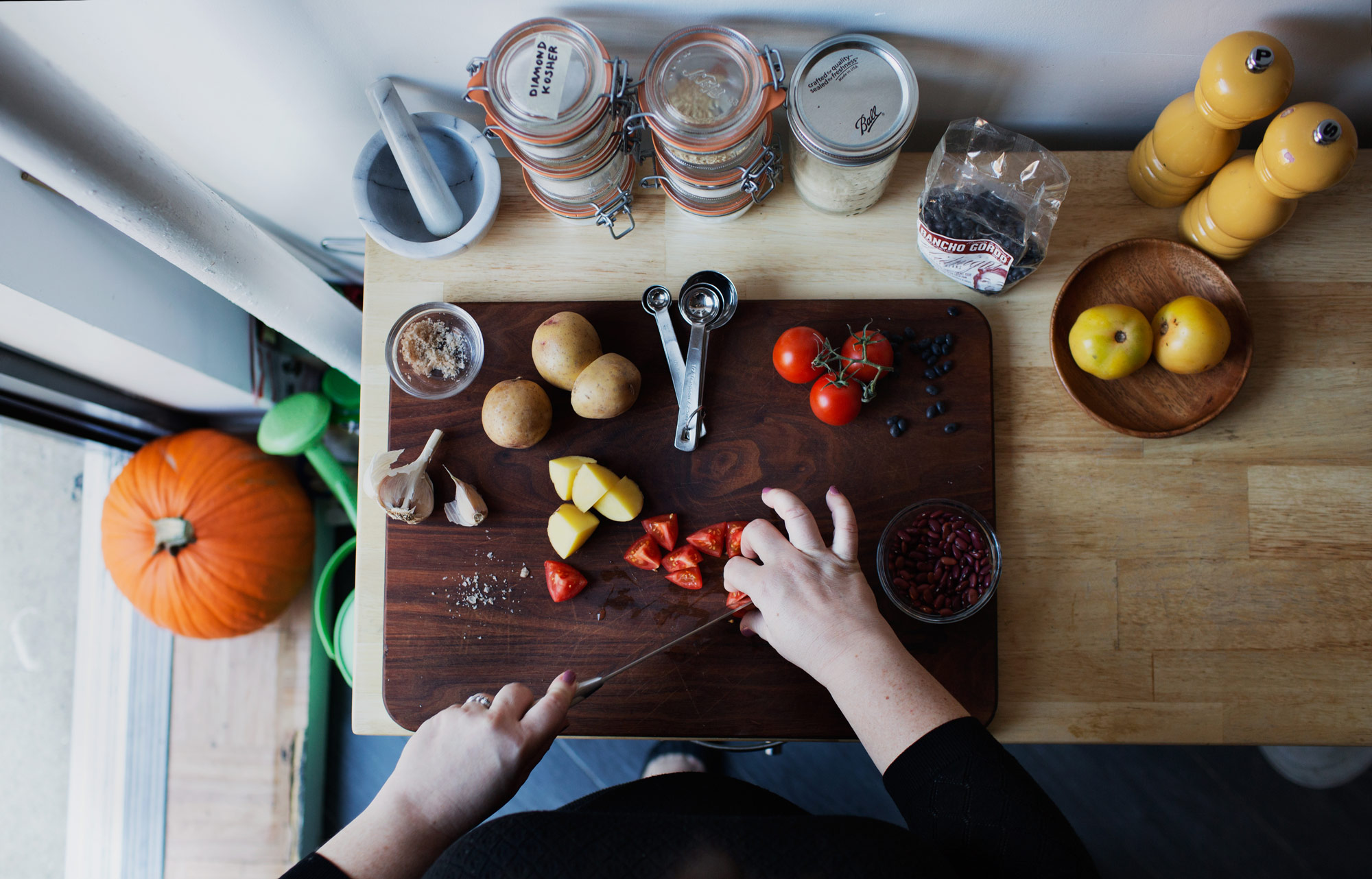
“It makes me happy when people tell me, ‘I didn’t know how to cook this, but you walked me through it,’ or, ‘I thought I didn’t like this dish, but I just hadn’t made it this way before.’ It means a lot, because that’s where I was five minutes before them. I still feel like I’m learning as I go.”
And you were still working a day job at that time? Yes, I had been working as an art therapist for five years. After a while, I wanted to switch to something closer to publishing, so I took a reporter job at a technology magazine and worked there for about four years while writing Smitten and, afterwards, Smitten Kitchen.
Was there an “Aha!” moment when you realized that you could work on Smitten Kitchen as your job? There were a few different moments. When I started Smitten Kitchen in September 2006, I assumed it was only going to last until Christmas, because what do I know about cooking? I didn’t go to cooking school—I’m trying to figure things out like everybody else. I enjoy cooking, but all I know is what I like and don’t like. Other cooking blogs at the time seemed to be more professional. I didn’t think anyone would read it, but when it hit the six-month mark, it had actually grown quite a bit: I had more readers than I had ever had on my previous blog. Throughout the next year, it kept growing, so I kept doing it.
The publishing industry being what it is, there were people being laid off almost every month at my job. With each new wave of layoffs, I started wondering, “What am I going to do if I lose my job?” As my readership grew, my revenue from it started providing a little bit of extra income each month, and it later grew into a supplemental income. I decided that if my blog revenue ever matched the income I received at my day job, then I would quit and write the blog full-time. I hit that point in the middle of 2008 and have been doing it ever since.
Were you feeling pretty confident about going full-time with the site, or were you still a little wary about abandoning your day job? It’s been seven years since I made the leap, but I’m still terrified in the same way I was on the first day. I am completely on my own, without a safety net, and I have no guarantee of future income from day to day. I know most self-employed people are excited about being able to be creative on their own terms, which I am, but I also like being able to support myself and my family. I happen to love what I do, but that is something I still worry about all the time.
Your cookbook, The Smitten Kitchen Cookbook, came out at the top of the best-seller list in 2012. How did that book come about? I was actually very resistant to writing a cookbook. I thought it would seem like I was trying to prove something, and I kept having all of these weird, erroneous thoughts about it. I had agents and literary types reaching out to me early on with ideas for the kinds of terse books that are seen on end caps in bookstores and then disappear within three months, but I didn’t think it was necessary at the time. I was approached by publishers every once in a while, but I think that was the experience of a lot of people during the early days of blogging. Blogs were something new and rare at that time, so agents were paying attention from the beginning. I came around eventually, though, and as soon as I started writing it, I had fun.
Is there anything you’re interested in pursuing in the coming years that you’re not already doing? I am a truly picky eater, and that drives everything for me. I want dishes to be a very specific way, so I’m not even close to being out of ideas. I hope that I’m able to keep doing this, and at a quality that people want to follow along with at home.
There are people who have become the next Food Network stars, food editors at big magazines, cookbook authors, or restaurant critics, but I’m not sure where I fit in with all of that. I never knew exactly what I wanted Smitten Kitchen to be. I really enjoy doing it every day, and I hope to continue doing it. I also think doing a TV show would be fun in the future.
But I wonder, does the world really need another expert telling people what to do? Most cooking resources, especially cookbooks and the Food Network, are dominated by professional chefs with big-name restaurants. That’s great, but what about the rest of us—the people without unlimited budgets or access to freshly-plucked produce? How are we supposed to cook? There has to be a place for all of us. Most people I talk to are merely trying to make dinner rather than aspirational, perfectionist meals. At the same time, people don’t just want 25-minute meals or 5-ingredient dishes or a bunch of things they can dump in a crockpot that will taste good-ish. They want something they can be excited about, and that aspect of cooking still feels a little under-tapped to me.
It makes me happy when people tell me, “I didn’t know how to cook this, but you walked me through it,” or, “I thought I didn’t like this dish, but I just hadn’t made it this way before.” It means a lot, because that’s where I was five minutes before them. I still feel like I’m learning as I go.
“I should probably have more confidence, but I don’t, and I don’t believe confidence is all that it’s cracked up to be. Maybe being a little bit worried…actually makes you work harder.”
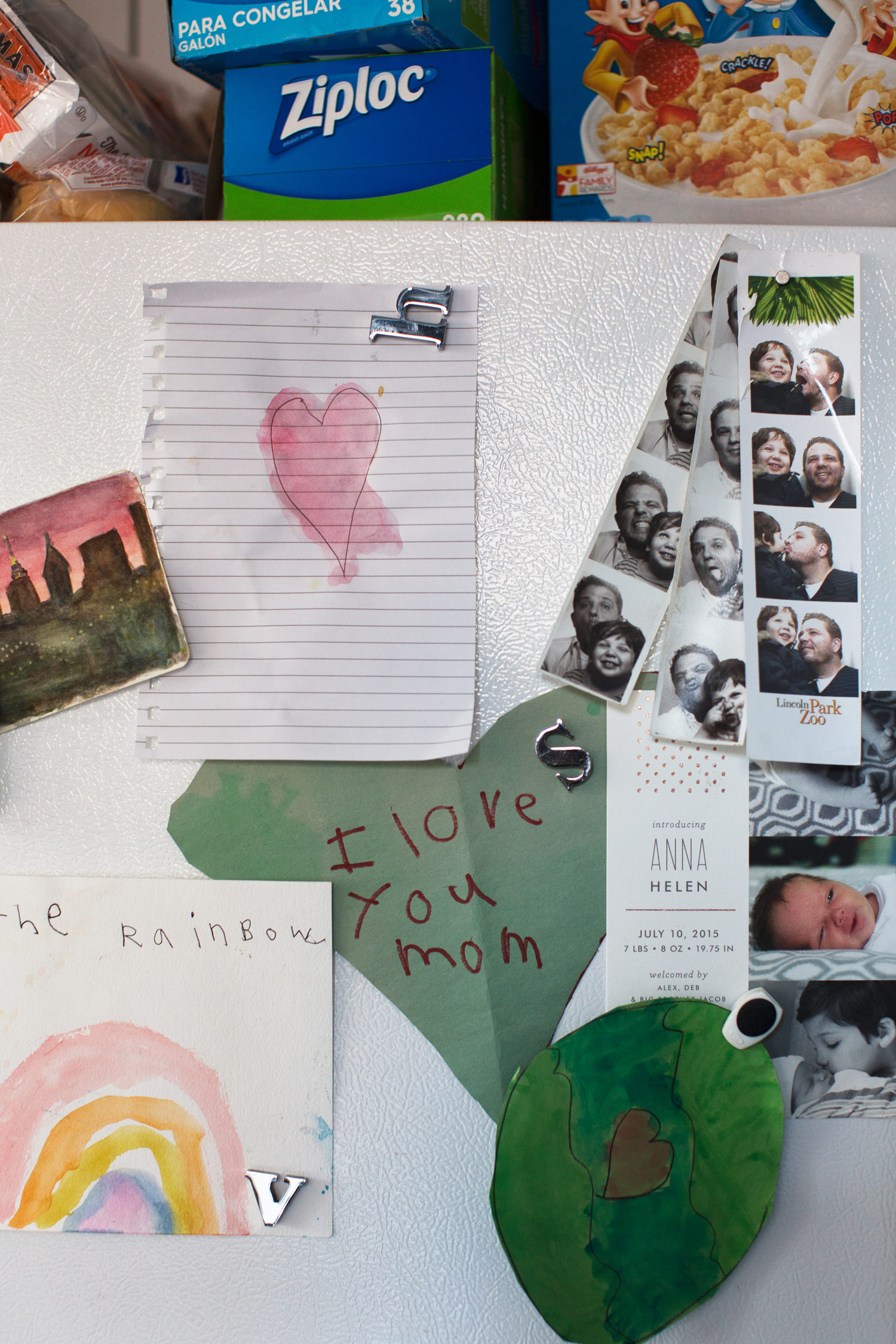
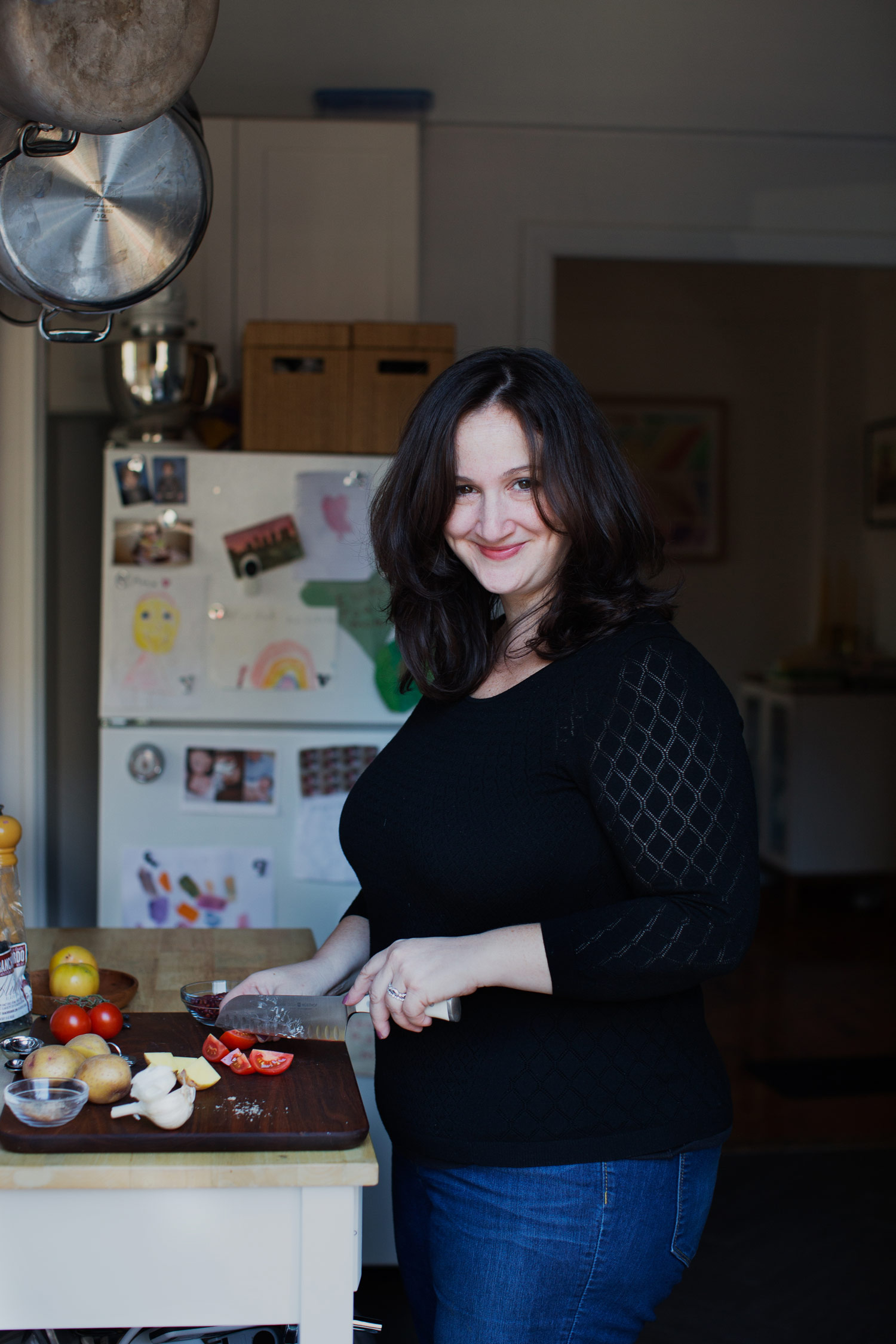
It’s not uncommon for the people we talk to who’ve been doing what they’re doing for a long time to say they still feel like beginners. I’m glad it’s not just me. I should probably have more confidence, but I don’t, and I don’t believe confidence is all that it’s cracked up to be. Maybe being a little bit worried about how you’re doing actually makes you work harder. Every day, we’re surrounded by pithy articles on Facebook and Tumblr and Twitter that tell us to be confident, go for it, and trust our guts. When I read that, I think, “But I don’t trust my gut, and I’m not completely confident.” What’s wrong with second-guessing yourself and getting a second opinion from outside of your head? Are these truly bad traits? If those feelings make you work harder, then that should count, too.
What has been the biggest risk you’ve taken to move forward? Preparing to have a kid was scary, because I was so afraid of motherhood turning out to be some kind of vortex, sucking me in and making me look up 15 years later and ask, “What happened to my career?” I love my kids, but I never planned to be a stay-at-home mom; it wasn’t what I felt cut out to do. When I had my son, Jacob, I would have loved to live in a perfect world where I could just play with him for three years and then pick up my career where it left off. I knew that wasn’t a reality, so I was happy to work from home and get the best of both worlds.
Publishing a cookbook was another big risk. Everything was going well with the site, so if the cookbook flopped, could I really just go back to what I had been doing before? It felt risky even though it was a no-brainer from a publishing standpoint.
But your cookbook was successful when it came out, and it continues to be successful today. Yes, but I’m still recovering from the shock. (laughing) It was released on the same day that Ina Garten released a cookbook, so I can’t even get my head around that. It was really cool: I did a lot of book touring and met a lot of people, and it was so much fun.
Now people are asking when my next book is coming out, but I’m thinking, “Whoa, I have to write another one?” (laughing) I can say now that I am in fact writing another one, but it has been stalled because I decided to have another child. That is a good thing, but it’s not the best for publication schedules and contracts. As much as I’m bummed that it has been delayed, my primary concern is that it’s worth the wait. It needs to be that much better than the first one, and I hope it will be.
Are your family and friends supportive of what you do? Extremely. My family was good and nervous when I quit my day job, as they should have been, but they are unbelievably supportive. I started writing The Smitten Kitchen Cookbook when my son was about six months old. If it wasn’t for the village of people helping me out during that time, I wouldn’t have been able to pull it off.
Are you creatively satisfied? I don’t know what it means to be creatively satisfied, but I feel extremely lucky every day that I get to do this. To not have to choose between having a career and seeing my kids between 7am and 6pm is a luxury that few people have.
Ironically, I do a lot more creative work now than I did before I decided not to be an art person. I might not do much painting or drawing these days, but I’ve really gotten into photography since starting my blog. It might be fun to do more fine art in the future, but for now I’m just into doing art projects with my kid.
If you were to give advice to a young person just starting out, what would it be? First off, I’d tell them to just do it. Secondly—and more importantly—don’t worry about what everyone else has done or is doing. If you constantly think, “Somebody has already made this,” then you’re never going to make anything. I’m not making things that haven’t been done before. It helps to find a way to differentiate yourself, but you don’t need to know how to do that on the first day. Develop and hone your own voice. If you’re not having fun with what you’re doing, you’re either going to burn out or your audience will. But if you enjoy what you do, that energy becomes infectious.
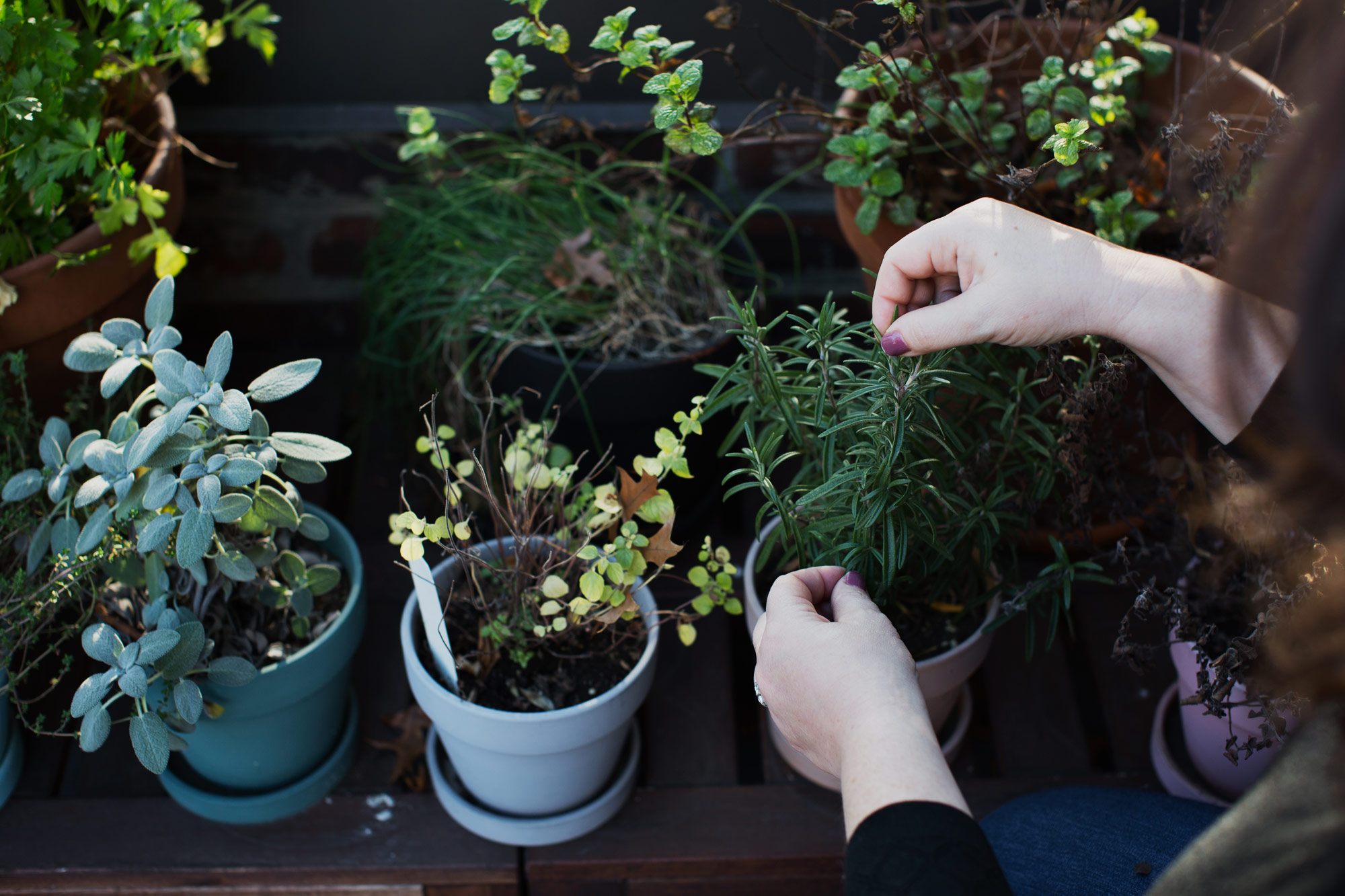
“If you constantly think, ‘Somebody has already made this,’ then you’re never going to make anything. It helps to find a way to differentiate yourself, but you don’t need to know how to do that on the first day.”
Right, it’s about sharing what you already enjoy doing for yourself. If other people happen to enjoy it, too, then that’s great. Exactly. I’ve heard from a lot of people who want to start their own blogs, and they think they need professional photography or in-depth essays or sophisticated recipes in order to be successful, but they don’t. Those are tools that can aid creativity, not creativity itself. I know food bloggers who have written for years and only recently became good at point-and-shoot photography. And maybe you don’t even want photos; maybe you want to do drawings of the food instead. Or maybe you feel like you can tell a good enough story that you don’t need visual aids. None of these are invalid ways to talk about food or any other topic.
In my case, I chose not to do step-by-step pictures because I like the idea of food being decoration for the website. I’m not interested in food styling: I like taking pictures that show the details of the food as it actually looks. When you see a photo of an overly styled dish that you’re supposed to cook at home, you’re going to be disappointed when your food doesn’t look like that. I can’t relate to stunning, gaudily lit photos of perfectly plated dishes arranged on an old, wooden barn table with frost-hued linen and wildflowers—that’s not my life, and it has nothing to do with the way I actually cook. My goal is to encourage people—their dish will probably look something like my pictures. I try to have good, natural lighting, and that’s about it. If people see that, then hopefully they’ll feel confident enough to try it.
How does living in New York City influence your creativity or the work that you do? My parents are both from here—my dad grew up in the Bronx, and my mom grew up in Queens—so I assumed I’d pull off living here, too. You have to make an income here from the outset, and that definitely pushes you to think seriously about what you do. I didn’t start a blog thinking that I could make a living from it in any way—that was unheard of in 2003. Even now, that’s hard to do, so I think I was lucky in terms of when I started and when my site took off.
New York City provides the pressure to succeed financially, but I also love how busy it is here. It’s great for people who get inspired by having a lot of different things happening around them. I can eat foods from around the world and see so much inspiring variety within a 10-block radius of my apartment.
Of course, you don’t have to live in New York City to be creative or inspired. People ask, “Are you going to get a house in the suburbs?” And I think, “Oh, god, I hope not!” However, if I decide that it’s no longer working for me in the city, then I hope I won’t be stuck on the idea of being a New Yorker.
What does a typical day look like for you? I’m not going to count the last few months with a newborn, because I haven’t really reached a new normal yet. (laughing) But prior to the newborn, I would wake up, pack my kid a lunch, drop him off at school, and get coffee on the way back. I’m much better at writing and answering emails in the mornings, and I tend to be better at doing less computer-facing tasks in the afternoon. In the mornings, I’ll update the site, polish photos, and finish writing or try a new recipe; and in the afternoons, it’s often me cooking, planning, or shopping for ingredients.
I so rarely have that typical day, though. That happens once every two weeks, but that’s what I’d like to get back to eventually.
Is it important to you to be part of a creative community of people? I haven’t thought about it much because I didn’t define myself as a creative type until recently. It took me decades to realize that I am doing creative work, but I don’t fully identify as an artist, so it hasn’t been something I’ve filled my life with.
The people in my life are made up of a random assortment of people who all do completely different things. Most of my friends actually don’t cook much and prefer to eat out—they joke that their apartments are so small that they use their ovens for storing sweaters. My husband doesn’t do creative work at all and has a limited interest in cooking, yet he’s my favorite person to talk to. I like that we all have different interests because I become inspired by having a mix of people around me—I even have a friend who is a Republican! (laughing)
Are there any cookbooks that you’re into right now? I have hundreds of cookbooks, so I can’t pick a favorite, but right now I love the cookbook, Pok Pok: Food and Stories from the Streets, Homes, and Roadside Restaurants of Thailand. It’s completely random, but I tend to like recipes that aren’t similar to my day-to-day cooking.
I also really like what Heidi Swanson of the food blog, 101 Cookbooks, is doing. She has a new vegetarian cookbook out called Near & Far: Recipes Inspired by Home and Travel.
What type of legacy do you hope to leave? Oh, good god. (laughing) I’d feel lucky enough just to be somebody who people would want to have a legacy. Once you have kids, you start thinking about how they’re going to remember you, so I hope they’d think that I was a good mom and that they’d be proud of the work I’ve done. I hope that this is just the beginning of my career, because I want to do a lot more.
“I’m not interested in food styling: I like taking pictures that show the details of the food as it actually looks. When you see a photo of an overly styled dish that you’re supposed to cook at home, you’re going to be disappointed when your food doesn’t look like that.”
